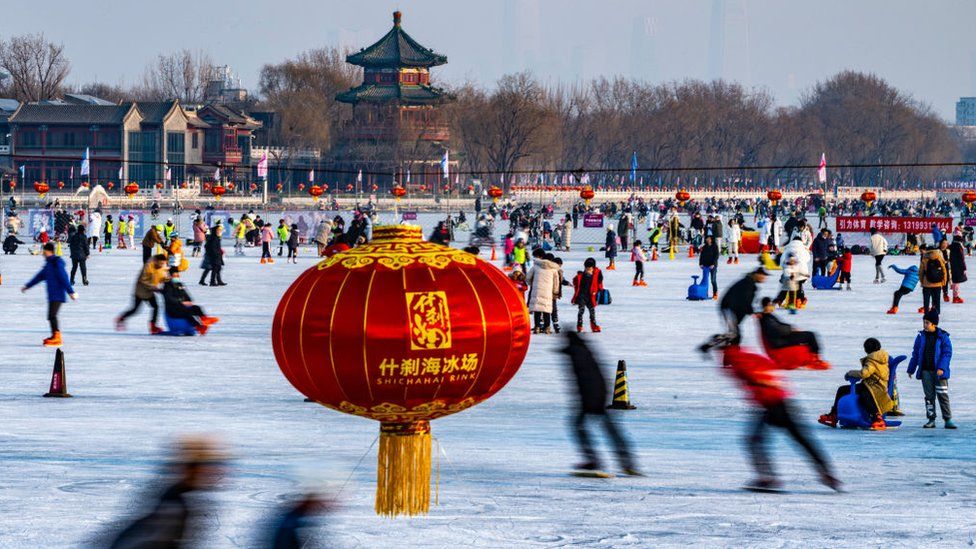ARTICLE AD BOX
 Image source, Getty Images
Image source, Getty Images
Life is slowly inching back to normal in China
When Mr Chen's 85-year-old father fell ill with Covid in December, it was impossible to get an ambulance or see a doctor.
They went to Chaoyang Hospital in Beijing, where they were told to either try other hospitals or sit in the corridor with an IV drip.
"There was no bed, no respiratory machine, no medical equipment" available, Mr Chen tells the BBC.
His father managed to find a bed at another hospital, but only through a special contact, and had by then developed a severe lung infection.
The elder Mr Chen has now recovered, but his son worries that a second infection in the future could kill him.
Three years of Covid prevention measures were a complete waste and failure, he says, because the government eased controls too quickly, with no preparation, and so many have caught the virus.
"The outbreak will come back again. For elderly people, they can only count on their own fate," Mr Chen says.
The final step in China's swift reversal of its contentious zero-Covid policy comes on Sunday when it reopens borders for international travel. With mass testing, stringent quarantines and sudden, sweeping lockdowns gone, families like Mr Chen's are wary of what lies ahead.
But younger Chinese, all of whom did not wish to be named, feel differently - and some told the BBC they were voluntarily exposing themselves to infection.
A 27-year-old coder in Shanghai, who did not receive any of the Chinese vaccines, says he voluntarily exposed himself to the virus.
"Because I don't want to change my holiday plan," he explains, "and I could make sure I recovered and won't be infected again during the holiday if I intentionally control the time I get infected." He admits he did not expect the muscle aches that came with the infection, but says the symptoms have been largely as expected.
Another Shanghai resident, a 26-year-old woman, tells the BBC she visited her friend who had tested positive "so I could get Covid as well".
But she says her recovery has been hard: "I thought it would be like getting a cold but it was much more painful."
Image source, Getty Images
Image caption,There is concern about how elders will fare under loosened pandemic rules
A 29-year-old who works for a state-run business based in Jiaxing, in the northern Zhejiang province, says she was thrilled when she heard the country's borders were reopening. She is excited to travel to other parts of China again to see concerts.
"Life was ridiculous when I had to ask my manager's permission to travel. I just want life to get back to normal," she says. "But I do worry about the elderly."
When her grandfather fell sick with Covid, he refused to go to hospital, even when his condition took a turn for the worse, she says. And reports of overwhelmed hospitals and crematoriums have only added to the worry - she says she has heard stories of corpses piled high in funeral parlours.
She herself has not tested positive for the virus yet, but concedes that - when her husband did - she wore a mask 24/7 at home, even when she was sleeping.
"I did not want us to be sick at the same time," she says. "But I'm not scared of the virus, as the severe symptoms are rare."
At least in the big cities, people have been returning to malls, restaurants and parks, and even queuing up for visas and tourist permits. The state-run Global Times newspaper declared "normal times are back", attributing the line to interviews with Chinese.
If normal days are indeed back, it is an uncomfortable return to normalcy for many.
Mrs Liu's husband never got vaccinated because he suffers from advanced diabetes. Since the re-opening, she has stayed indoors and has disinfected every home delivery that has arrived, but the couple still caught the virus.
Their daughter, also sick with Covid, scoured various locations in the midst of a cold Beijing winter for Paxlovid, Pfizer's anti-viral Covid medication, before finally purchasing a single box off the black market at 7500 CNY (£918).
"My husband has recovered smoothly. It's a big relief for me," Mrs Liu says. "But when the second wave comes, what will happen to him?"
Ms Wang, another Beijing resident, and her family have pre-purchased Paxlovid before it becomes too expensive, as well as an oxygenator and pulse oximeter, for her grandfather-in-law. He has not gotten the virus but is in his 90s.
"Anyways, the open-up is good for the economy. Business has recovered quickly," she remarks, adding that hotels, restaurants and shopping malls are all filling up with people again.
Image source, Getty Images
Image caption,Despite the fear over the Covid surge, people are going back to restaurants and malls
But beyond the major cities, it is difficult to know how people - particularly in China's rural regions - are responding to an about-face in government messaging.
For three years, state-run media presented the virus as a dangerous menace to society, vowing that it would achieve "dynamic zero-Covid" to keep the population safe.
But that rhetoric has been turned on its head in recent weeks, with doctors regularly trotted out to call for calm over confusion.
Mrs Li, a 52-year-old in Beijing, argues the government "did the right thing" for the first two years but should have ended its zero-Covid policy in early 2022.
"Now we finally have all controls eased, but it's too sudden. The government could have done it phase by phase, region by region. Also winter is the worst season to do it. Why not wait until next spring? And why didn't the government prepare enough resources before opening up?" she asks.
"2022 was the worst year for us. I can only pray 2023 won't be any worse."

 2 years ago
49
2 years ago
49








 English (US) ·
English (US) ·